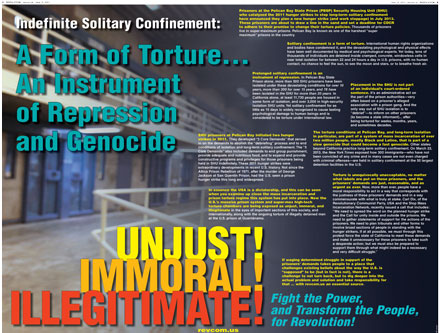Indefinite Solitary Confinement:
A Form of Torture... An Instrument of Repression and Genocide
June 16, 2013 | Revolution Newspaper | revcom.us
Download PDF Poster of this page
* Prisoners at the Pelican Bay State Prison (PBSP) Security Housing Unit (SHU) who catalyzed the 2011 hunger strikes to stop long-term solitary confinement have announced they plan a new hunger strike (and work stoppage) in July 2013. These prisoners are about to draw a line in the sand and set a deadline for California Department of Corrections and Rehabilitation (CDCR) to adhere to their promise to change their torture policies. Thousands of prisoners live in super-maximum prisons. Pelican Bay is known as one of the harshest “super maximum” prisons in the country.
* Solitary confinement is a form of torture. International human rights organizations and bodies have condemned it, and the devastating psychological and physical effects have been well documented by medical and psychological experts. Yet today, tens of thousands of individuals are detained inside cramped, concrete, windowless cells in near total isolation for between 22 and 24 hours a day in U.S. prisons, with no human contact, no chance to feel the sun, to see the moon and stars, or to breathe fresh air.
* Prolonged solitary confinement is an instrument of repression. In Pelican Bay State Prison alone, more than 500 SHU prisoners have been isolated under these devastating conditions for over 10 years, more than 200 for over 15 years, and 78 have been isolated in the SHU for more than 20 years. In California alone, at least 11,730 people are housed in some form of isolation, and over 3,000 in high-security isolation SHU units. Yet solitary confinement for as little as 15 days is widely recognized to cause lasting psychological damage to human beings and is considered to be torture under international law.
* Placement in the SHU is not part of an individual’s court-ordered sentence. It’s an administrative act on the part of the prison authorities—very often based on a prisoner’s alleged association with a prison gang. And the only way out of SHU isolation is to “debrief”—to inform on other prisoners (to become a state informant)... after being tortured for weeks, months, years, and sometimes decades.
* SHU prisoners at Pelican Bay initiated two hunger strikes in 2011. They developed “5 Core Demands” that zeroed in on the demands to abolish the “debriefing” process and to end conditions of isolation and long-term solitary confinement. The “5 Core Demands” also included demands to end group punishment, provide adequate and nutritious food, and to expand and provide constructive programs and privileges for those prisoners being held in SHU indefinitely. These 2011 hunger strikes were extraordinary developments in recent U.S. history. Not since the Attica Prison Rebellion of 1971, after the murder of George Jackson at San Quentin Prison, had the U.S. seen a prison hunger strike this long and widespread.
* The torture conditions at Pelican Bay, and long-term isolation in particular, are part of a system of mass incarceration of over two million people, mostly Black and Latino, that is part of a slow genocide that could become a fast genocide. Other states beyond California practice long-term solitary confinement. On March 23, 2013, the New York Times exposed how 300 immigrants—who have not been convicted of any crime and in many cases are not even charged with criminal offenses—are held in solitary confinement at the 50 largest detention facilities in the U.S.
* In essence the USA is a dictatorship, and this can be seen when you examine up close the mass incarceration and prison torture regime this system has put into place. Now the U.S.'s massive prison system and super-max high-tech torture chambers are being exposed as unjust, immoral, and illegitimate in the eyes of important sections of this society, and internationally, along with the ongoing torture of illegally detained men at the U.S. prison at Guantánamo.
* Torture is unequivocally unacceptable, no matter what labels are put on these prisoners, and the prisoners’ demands are just, reasonable, and as urgent as ever. Now, more than ever, people have a moral responsibility to act in a way that corresponds with the justness of these prisoners’ demands and in a way commensurate with what is truly at stake. Carl Dix, of the Revolutionary Communist Party, USA and the Stop Mass Incarceration Network, recently issued a call that includes: “We need to spread the word on the planned hunger strike and the Call for unity inside and outside the prisons. We need to gather statements of support for the actions of the prisoners. We need to plan tribunals and other forms to involve broad sections of people in standing with the hunger strikers. If at all possible, we must through this protest force the state of California to meet these demands and make it unnecessary for these prisoners to take such a desperate action; but we must also be prepared to support them through what might indeed be a necessary and very difficult struggle.”
* If waging determined struggle in support of the prisoners’ demands takes people to a place that challenges existing beliefs about the way the U.S. is “supposed” to be (but in fact is not), there is a challenge to not turn back, but to dig deeper into the actual problem and solution and take responsibility for that ... with revcom.us an essential resource.
Fight the Power, and Transform the People, for Revolution!
If you like this article, subscribe, donate to and sustain Revolution newspaper.

